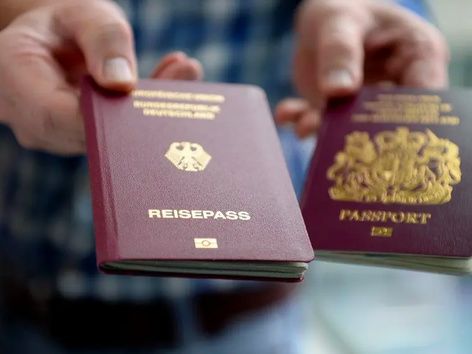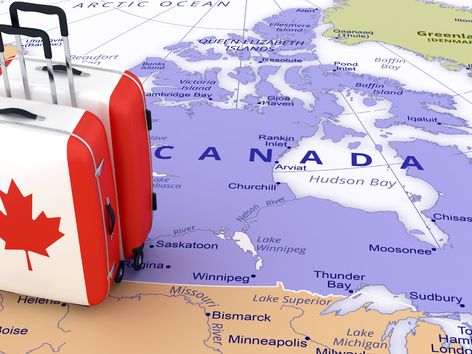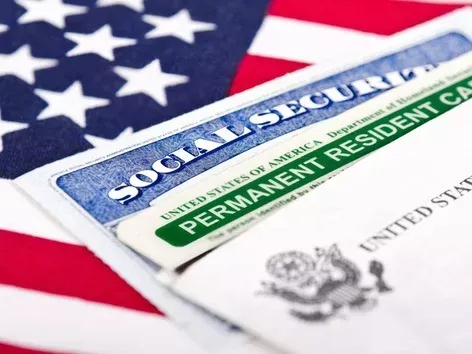Moving to the EU: rules for obtaining a residence permit in France, Germany, Italy, the Netherlands and Spain
Table of contents
- Obtaining permanent residence in France
- The difference between permanent residence and citizenship in France
- Permanent residence in Germany
- The difference between permanent residence and citizenship in Germany
- Applying for permanent residence in Italy
- The difference between permanent residence and citizenship in Italy
- Application for permanent residence in the Netherlands
- The difference between permanent residence and citizenship in the Netherlands
- Permanent residence in Spain
- The difference between permanent residence and citizenship in Spain

Moving to EU countries always raises a lot of questions, especially when it comes to the rules for obtaining a residence permit. France, Germany, Italy, the Netherlands and Spain: these countries are in the focus of attention of those planning to move to the EU. Find out more about the process of obtaining a residence permit in these countries, including requirements, deadlines, procedures and costs
After moving to a new country, it is worth moving on to the next stage - obtaining a permanent residence permit. This type of visa often has more advantages than other types of visas. Some countries provide a fast track to long-term residence through golden visa programmes, but it is worth bearing in mind that many of these opportunities are now closed.
Although long-term resident status in the European Union can be obtained by living there for at least five years, most countries grant national permits rather than a European permit. The application process for such a permit may include language tests and other integration requirements, depending on the country.
Thus, the procedure for applying for a permanent residence permit may differ from one EU member state to another. It is important to research in detail the requirements and processes in each country before applying.
Obtaining permanent residence in France
To obtain permanent residence in France, you need to live there for a certain period of time. This is usually 5 years, but if you are the spouse or family member of a French citizen, the period can be reduced to 3 years. You can apply either on the basis of a temporary French visa or as an EU/European Free Trade Association (EFTA) citizen.
It is also important to be integrated into the French culture and have a sufficient level of French language skills (at least A2). Applicants must not have any criminal convictions or outstanding convictions for criminal offences.
After successfully passing the test and meeting the requirements, you will be granted the opportunity to stay in the country indefinitely and access most public services. The residence permit is usually valid for 10 years, but it can be extended.
The cost of a permanent resident card is €225, which must be paid using tax stamps that can be purchased online.
For more information on obtaining a visa, crossing the border, getting a job, and becoming a French citizen, please see the written guide from Visit World here.
The difference between permanent residence and citizenship in France
Obtaining a residence permit or citizenship in France opens up many opportunities for you. You have the right to study, work, own real estate, get a mortgage and start your own business. You can also benefit from social benefits and the country's healthcare system. Free entry and exit from France is also guaranteed.
However, there are differences between a residence permit and citizenship. Once you become a French citizen, you get a French passport, the right to vote and the possibility of free travel for any period of time. For those who cannot hold dual citizenship, a temporary residence permit may be a better choice. France does not require you to renounce your previous nationality when you obtain French citizenship.
Permanent residence in Germany
Germany offers permanent residence for those who have lived in the country for several years, starting from a period of temporary residence. If you are not an EU/EFTA citizen, you need to have a residence permit for family reunification, study or work purposes before applying. You usually need to have lived in Germany for 5 years, but this period can be reduced for certain categories of residents, such as graduates, skilled workers or family members of citizens.
In addition, in order to obtain a residence permit, you need to be integrated into German society, have an A2 level of German language proficiency and financial stability. It is also necessary to have a clean criminal record and secure accommodation.
Once you meet all the criteria, you can submit an application to the local immigration office. The cost of the procedure ranges from €113 to €147, depending on the chosen speed of obtaining a residence permit and the specifics of your status.
For more information on obtaining a visa, crossing the border, getting a job, and becoming a German citizen, please see Visit World's written guide here.
The difference between permanent residence and citizenship in Germany
There are some differences between permanent residence and citizenship in Germany. Both types of documents give the right to work, study, start a business and other social benefits. A temporary residence permit is valid for an unlimited period of time, but permanent residence permit holders are restricted from leaving the country for more than six months.
The main difference is that permanent residence permit holders cannot obtain a German passport, vote and have limited citizenship rights for their children. However, the new legislation allows for citizenship in 5 years, or 3 years with "special integration achievements". It also lifted restrictions on dual citizenship, allowing for a wider range of people to become citizens.
Applying for permanent residence in Italy
In order to apply for permanent residence in Italy, you need to have five years of residence in the country. It is also important not to leave the country continuously for more than 6 months or 10 months in total, except in cases such as military duty, work in other EU countries or retirement after living in Italy for at least 3 years and working for the last 12 months.
Documents on health insurance, no criminal record and passing an A2 language test are also required. In addition, applicants must show a minimum annual income that exceeds the level of social assistance and have suitable accommodation.
The application fee is EUR 176.46, which includes the cost of the application form, electronic card, application stamp and postage. Certain categories of persons are exempt from paying this fee, such as minors, refugees and persons undergoing medical treatment.
For more information on obtaining a visa, crossing the border, getting a job, and becoming an Italian citizen, please see the written guide from Visit World here.
The difference between permanent residence and citizenship in Italy
A permanent residence visa in Italy allows you to study, work, start your own business and travel to other EU member states for work or study. You also have access to Italian social security, public housing, education and pension programmes.
However, there are restrictions on the duration of your stay in the country, namely no more than six consecutive years. Citizenship has its advantages, including a passport, full voting rights and additional rights for children. It is important to note that Italy has lenient rules regarding dual citizenship, so you do not have to give up your other citizenship to obtain it.
Thus, while a permanent residence visa opens the door to many opportunities in Italy, citizenship brings additional benefits and stability in legal status.
Application for permanent residence in the Netherlands
In the Netherlands, there are four types of permanent residence permits, each of which corresponds to a specific category of persons. The first type is for EU/EFTA citizens and their family members, the second is for non-EU citizens with a long-term residence permit valid in all EU countries, the third is for persons on the basis of asylum status, and the fourth is for EU citizens residing in the Netherlands but not on a permanent basis.
To obtain permanent residence, you must meet several requirements. In particular, you must have lived in the country legally for 5 years, have your main place of residence in the Netherlands, no criminal record and a confirmed income.
Permanent residence is subject to periodic renewal every 5 or 10 years. However, if your current residence permit is limited in duration, you cannot apply for a permanent residence permit.
The application fee depends on your status. For EU/EFTA citizens, it is 69 EUR, and for other categories of residence permits - 207 EUR. You will also need to have a citizen's service number (BSN) and pass the Dutch civic integration exam.
It is important to note that if your application is rejected, the application fee is non-refundable. Therefore, before applying, it is important to carefully check all the requirements and prepare for the process of obtaining permanent residence in the Netherlands.
For more information on obtaining a visa, crossing the border, getting a job, and becoming a Dutch citizen, please refer to the written guide from Visit World here.
The difference between permanent residence and citizenship in the Netherlands
Permanent residence and citizenship in the Netherlands require applicants to reside in the country for 5 years and fulfil integration requirements. Both statuses provide extensive rights, including work, study, starting a business and buying real estate. In addition, they allow travelling abroad and access to the social security system.
However, citizenship provides additional benefits, such as a passport, full voting rights and the possibility of indefinite residence abroad. The difference is that citizenship does not require periodic renewal, as in the case of a permanent residence permit. Also, children born to Dutch citizens receive more rights.
It should be borne in mind that the Netherlands has strict rules on dual citizenship, and most citizens cannot hold it except in limited situations. This is an aspect that is important to consider when deciding between permanent residence and citizenship in the Netherlands.
Permanent residence in Spain
Obtaining permanent residence in Spain is a time-consuming and costly process. While staying in the country for 5 years with a Número de Identidad de Extranjero (NID) number, you must have a stable income or sufficient financial resources to support yourself. You will also need valid health insurance and, in some cases, certificates of divorce, marriage or no criminal record.
During these 5 years, you may have to change the type of visa, as many visas are granted for a short period of time. For example, student visas, which can be valid only for a certain period of time, count as one part of the total period of stay.
To obtain a permanent residence permit in Spain, you can also apply for a residence certificate from the Spanish police, which will help you determine the time you have lived in the country.
Compared to other EU countries, the procedure for obtaining permanent residence in Spain is quite economical. The application costs only 80 euros and, although there may be additional fees, they usually do not exceed 20 euros.
For more information on obtaining a visa, crossing the border, getting a job, and becoming a citizen of Spain, please see Visit World's written guide here.
The difference between permanent residence and citizenship in Spain
There are important differences between permanent residence and citizenship in Spain. Both grant almost identical rights, but citizenship requires 10 years of residence in the country, compared to five years for permanent residence.
Citizenship is necessary to vote in elections and receive social services, but it does not allow for dual citizenship with Spain and most other countries. This means that you will need to renounce your current citizenship when you obtain citizenship.
While a permanent residence permit provides stability and rights, citizenship opens up additional opportunities to participate in political life and access social services. It is important to keep these differences in mind when deciding between the two, based on your needs and plans for your future in Spain.
Daria Rogova, Head of Insurance at Visit World
To move, travel or work safely in a new country, you will need travel insurance. You can apply for an extended policy on our website here.
Products from Visit World for a comfortable trip:
Travel guide for 200 countries;
Legal advice from a local specialist on visa and migration issues;
Travel insurance around the world (please select the country of interest and citizenship to receive services);
Medical insurance all over the world.
More articles on the topic:
EU countries cancel golden visas: what is the reason?
The most affordable places to buy real estate abroad in 2024
The most affordable tourist destinations: where to go on holiday in 2024
Flight cancellations in Finland: February strike by airport workers
Romania and Bulgaria will enter the Schengen zone: what changes for travellers?
France is recognised as the most popular tourist destination in 2024
The safest countries in Latin America: a detailed overview
5 travel myths that will stop you from long-term travel
The most dangerous countries in the world to visit in 2024: ranking by Independent
Recommended articles
2 min
Residence permit
Law on citizenship in Germany: the procedure for issuing a passport has been eased in the country
The German authorities have adopted amendments to the law on citizenship that change the rules for acquiring dual citizenship and reduce the timeframe for migrants' right to naturalization. Find out more about how the procedure for obtaining German citizenship in 2024 was simplified, what are the requirements for applicants and when the approved changes will come into force in Germany
22 Jan. 2024
More details2 min
Travels
Flight cancellations in Finland: February strike by airport workers
In February 2024, Finland will become the scene of a protest by airport workers, which will lead to flight cancellations and great inconvenience for tourists. During the two-day strike, which will begin on 1 February, workers will protest against planned labour market reforms. Read more about the reasons and possible consequences of the February strike in Finland
24 Jan. 2024
More details2 min
Expats
Government of Canada announces new immigration projections: what to expect in 2024
The Government of Canada has announced new immigration projections that set the course for the country's immigration policy in 2024. These forecasts cover the volume of new immigrants, as well as the strategies and approaches Canada plans to use to attract and integrate expats. Learn more about the details of these projections and their possible impact on the country's development
26 Jan. 2024
More details2 min
Residence permit
Applications for the Diversity Visa Lottery 2027 will begin on October 1, 2025, a program in which the US government selects 55,000 winners each year and issues them with immigrant visas (Green Cards). Learn more about the requirements for participants in the US Green Card Lottery, how and when to apply, the procedure for selecting winners of the Diversity Immigrant Visa Program, and other important nuances that expats should know
26 Sep. 2025
More detailsAll materials and articles are owned by VisitWorld.Today and are protected by international intellectual property regulations. When using materials, approval from VisitWorld.Today is required.
